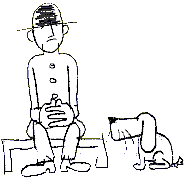|
You saw it here first!
Though it's only indicative, not diagnostic, here is a way to answer the question, am I (or is someone else) a narcissist?
Easy peasy! Listen carefully to what you (or they) say.
Parse the sentences.
(Remember this from grade school? Every complete sentence has a subject and a verb and perhaps other things like direct object, etc.) What is the subject of each sentence? If most of the time it's the first person (I, me) then narcissism is a probable characteristic of the speaker.

Ahem, ahem... I invented this myself. I claim no clinical value; it's merely for my own (and my friends like you) social interaction and amusement.
The
DSM-5
has a lot to say:
Individuals with narcissistic personality disorder generally have a lack of empathy and
have difficulty recognizing the desires, subjective experiences, and feelings of others.
They may assume that others are totally concerned about their welfare. They tend to
discuss their own concerns in inappropriate and lengthy detail, while failing to recognize
that others also have feelings and needs. They are often contemptuous and impatient with
others who talk about their own problems and concerns. These individuals may be oblivious
to the hurt their remarks may inflict (e.g., exuberantly telling a former lover that "I am now
in the relationship of a lifetime!"; boasting of health in front of someone who is sick). When
recognized, the needs, desires, or feelings of others are likely to be viewed disparagingly as
signs of weakness or vulnerability. Those who relate to individuals with narcissistic
personality disorder typically find an emotional coldness and lack of reciprocal interest.
These individuals are often envious of others or believe that others are envious of them.
They may begrudge others their successes or possessions, feeling that they better
deserve those achievements, admiration, or privileges. They may harshly devalue the
contri-utions of others, particularly when those individuals have received acknowledgment or
praise for their accomplishments. Arrogant, haughty behaviors characterize these individuals;
they often display snobbish, disdainful, or patronizing attitudes. For example, an
individual with this disorder may complain about a clumsy waiter's "rudeness" or "stupidity"
or conclude a medical evaluation with a condescending evaluation of the physician.
If you use my Narciss-O-Meter, be sure to give me attribution. Lest I conclude you are not totally concerned about my welfare, fail to admire me, or are less than appreciative of my arrogant, haughty behavior.
|


